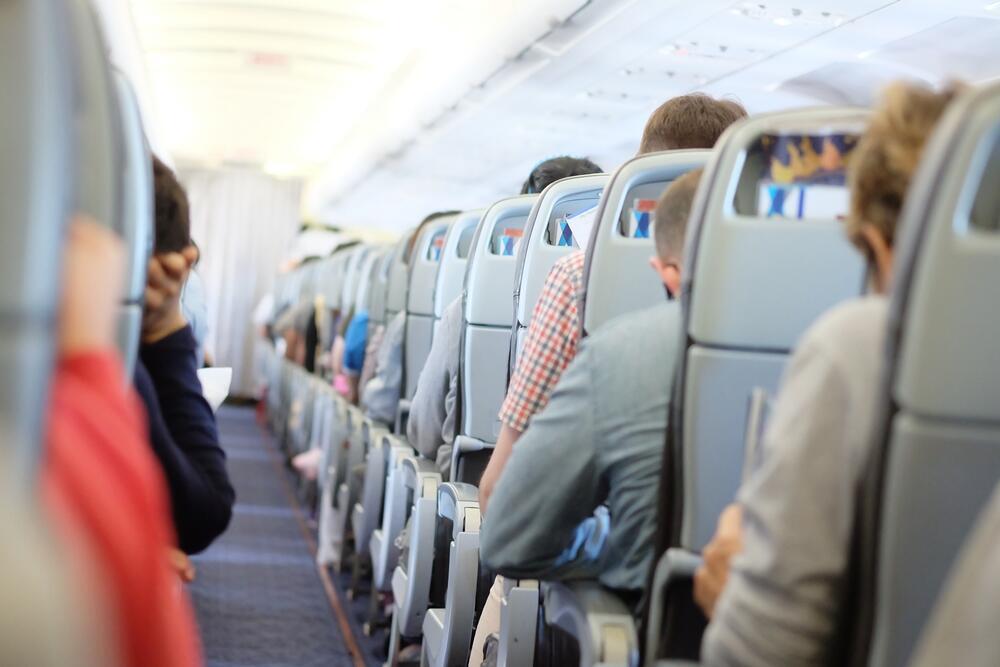During the recently concluded summer vacation and the upcoming holiday seasons, Ben Gurion Airport (BGY) is typically bustling with tens of thousands of travelers every day.
However, the war has significantly altered this scenario, leading to the cancellation of numerous flights. While nearby destinations remain popular, adventurous travelers are venturing to far-flung locales requiring over 10, sometimes even more than 20, hours of travel. Such lengthy flights can dramatically impact our health, causing fatigue, dehydration, decreased cognitive function, and even a heightened risk of dementia.
Prof. Amnon Lahad, head of the family medicine department at Clalit HMO, reassures that despite the risks, the number of in-flight deaths is exceedingly rare, with a ratio of one in ten million passengers. "Flying is very safe, and while rare, incidents do occur," he says.
"When a passenger boards already sick or tired, it exacerbates the situation," Prof. Lahad explains. He recounts dramatic cases where individuals report chest pain, sweating, and extreme weakness. Dr. Shelly Shumilov Klipper, a cardiologist and medical director at Meuhedet HMO, adds that studies have indicated frequent flyers risk impaired concentration and brain tissue damage. "It's an enormous stress on the body affecting cognition and mood, with significant impact. In the long term, it can also lead to the development of dementia."
Another common issue nearly all long-haul travelers face is jet lag. Contrary to popular belief, fatigue begins accumulating during the flight itself, not just after landing. "Even if you've slept enough before the flight, arriving in a place where day is night and night is day definitely leads to fatigue, mild confusion, and a general feeling of feeing under the weather, worsening with age," explains Prof. Lahad. Dr. Shumilov Klipper notes that jet lag can also increase the risk of strokes and heart attacks.
Prof. Lahad suggests, if possible, arriving at your destination during daylight hours and avoiding rest until evening. "It's best to avoid napping, get out into the daylight, and try to stretch the day as much as possible, eating according to the local schedule."
Another tip is to start adjusting your body to the destination's time zone a few days in advance by shifting sleep and meal times by an hour or two. Dr. Shomilov Clipper emphasizes that for people with chronic issues, good sleep before the flight, staying hydrated during the flight, and avoiding alcohol and heavy meals are crucial.
 Dr. KlipperPhoto: Inbal Marmari
Dr. KlipperPhoto: Inbal MarmariDr. Shelly Shumilov Klipper: "At-risk passengers should also take preventive actions against blood clots during the flight, such as walking in the plane at least once every hour and a half and moving their limbs to boost blood flow."
Blood clots in legs
A potential and dangerous side effect of long-haul flights is the formation of blood clots in the legs, known as deep vein thrombosis. The risk is increased not necessarily by the flight itself, but by the static position maintained for extended periods. The longer the flight, the higher the chance of occurrence.
Though relatively rare, Prof. Lahad attests that blood clots forming in the deep veins of the legs can send embolisms that might reach the lungs and heart, potentially life-threatening. Dr. Klipper adds that slowed circulation increases the risk of clot formation significantly, especially in individuals with a predisposition to hypercoagulability, where the risk during long flights is two to four times higher than in the general population.
She notes that the risk also rises among passengers post-surgery, after childbirth, undergoing hormonal treatment, or with heart failure and lung problems. These clots may form up to a month post-flight in leg veins and spread to the lungs.
Preventive measures before the flight
Prof. Lahad advises that high-risk passengers consider preventive medication before flying, such as a blood thinner injection to reduce risks, along with ensuring ample hydration during the flight. "Passengers with heart or lung problems or conditions affecting daily functioning should know that their condition may worsen during the flight; they should consult a doctor. In extreme cases, carrying an oxygen device on the flight is advisable."
Dr. Klipper adds that at-risk passengers should also take preventive measures against clots during the flight, such as walking in the plane at least once every hour and moving their limbs to strengthen blood flow in the organs and tissues.
Back and neck pain
Comfort during a flight is essential, not only for our overall well-being but also to prevent muscle and skeletal pain that can linger long after the flight. According to Lihi Tzur Dovrat, a senior physiotherapist and ergonomic consultant at Rabin Medical Center, our ability to avoid life-threatening conditions is linked to airplane ergonomics, especially on long flights.
 Lihi Tzur Dovrat
Lihi Tzur Dovrat"On long flights, passenger seats are typically arranged in groups of at least three, making it challenging for anyone who wants to get up or even shift without leaving their seat," Tzur Dovrat explains. She notes that seats are designed to generally fit the average man better, from seat width to the height of the headrest, which often do not match the average woman's needs. Consequently, most women find airplane seats less comfortable than men do.
Moreover, the low air pressure during flights, combined with prolonged inactivity, contributes to limb swelling and an overall sense of discomfort. "In an office or at home, we have control over our environment—whether it's the chair, cushions, or the ability to easily stand, stretch, or go to the bathroom and drink water. On a plane, there's not much we can do, and many flights are simply uncomfortable, leaving passengers with a stiff neck. The longer the flight, the more significant the discomfort."
Tzur Dovrat's general advice is to aim for maximum comfort during the flight, focusing on minimizing muscle strain during prolonged sitting. "You can achieve this by placing your feet on an object so they don't dangle down and bringing an extra jacket or shirt, rolling it up, and positioning it comfortably as neck support, which significantly reduces the need for stabilizing muscles."
Additionally, it's recommended to remove your shoes and wear comfortable, loose clothing while flying. It's also advisable to move your legs occasionally, not just keep them bent, rotate your ankles, and thus activate the entire venous and muscular system in the area. Tzur Deberat suggests that high-risk passengers and those with cardiovascular issues consider purchasing an aisle seat, which makes it easier to get up, stretch, and exercise if possible.
Prof. Amnon Lahad: "The main recommendation from experts is to drink plenty of water to prevent dehydration and a general feeling of malaise. We aren't used to these conditions, and it shows in our breathing and behavior."
Low oxygen levels and air pressure
Other factors affecting health during flights include the humidity and low air pressure on the plane. As a result, oxygen levels in the body decrease significantly. While this might not seem like a major issue at first glance, it can lead to dehydration, which poses a risk. Dr. Shumilov Klipper explains that low oxygen concentration in body organs, known as hypoxia, can impair function, especially among passengers with underlying health conditions. "Most organs in the body need oxygen, from the heart and lungs to brain tissues, and this can cause significant damage. The change in air pressure affects us and can also cause pressure and dryness in the respiratory tract."
It doesn't end there; the low air pressure on the plane also slows our cognitive responses, leading to a general feeling of discomfort. Dr. Klipper notes that studies have shown that prolonged oxygen deprivation can lead to concentration and memory problems, a general feeling of malaise, reduced cognition, and in some cases, the development of dementia. For these and other reasons, passengers on long flights often feel more tense, less sociable and devoid of patience.
Prof. Lahad explains that these feelings can lead passengers to lash out at the flight crew or argue over trivial matters. "This is related to the much lower oxygen levels. We usually don't engage in significant mental activity on a flight, which can create more conflicts than we might find reasonable."
The main recommendation from experts is to drink plenty of water to prevent dehydration and a general feeling of malaise. "We aren't used to these conditions, which comes across in our breathing and behavior," explains Prof. Lahad. In the most dramatic cases, the first solution is to try asking other passengers on the flight for medication to help manage the problem. "You can find a whole pharmacy on every plane."




